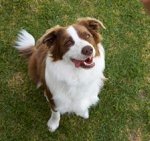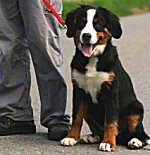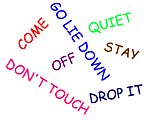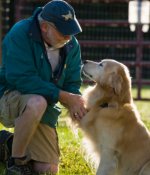Pekingese: What's Good About 'Em, What's Bad About 'Em
Pekingese temperament, personality, training, behavior, pros and cons, advice, and information, by Michele Welton, Dog Trainer, Behavioral Consultant, Author of 15 Dog Books
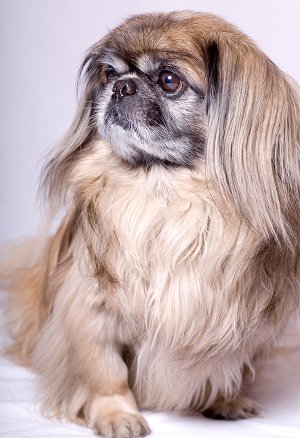
The AKC Standard says the Pekingese "should imply courage, boldness, and self-esteem, rather than prettiness, daintiness, or delicacy."
Indeed, the Pekingese is dignified, supremely confident, and one of the most independent (and stubborn) of the toy breeds.
Calm and quiet indoors, the Peke is content to lie on the sofa cushions much of the time, observing his kingdom with his direct, inscrutable gaze. Yet he will also surprise you with sudden bursts of comic playfulness. Some individuals are more lively than others.
Most Pekingese are loyal to their owner without being clingy. They are usually polite with strangers and other animals.
This proud, self-possessed dog is a superb choice for an adults-only home, and especially for senior citizens. But I don't recommend him with children, as he won't meekly submit to mischief or rough handling from anyone. He can also be possessive of his food and toys.
The Pekingese can be exasperatingly willful, but also surprisingly sensitive. He resents being jerked around or even scolded. However, if he respects you, he will be well-mannered without much formal training required.
With his short (unfortunately deformed) face, he must go through life snorting, snuffling, sneezing, and snoring.
If you want a dog who...
- Is small but extremely sturdy, even chunky in build
- Has a squashed face, large expressive eyes, and a thick coat that comes in many colors
- Is one of the most dignified, confident, and independent of the toy breeds
- Is calm and quiet indoors and doesn't need much exercise
- Is polite with strangers and usually accepting of other animals
- If he respects you, will be well-mannered without much formal training
A Pekingese may be right for you.
If you don't want to deal with...
- Strong-willed mind of his own, requiring a confident owner who can take charge
- Snorting, snuffling, wheezing, loud snoring
- Regular brushing and combing
- Heavy shedding
- Slowness to housebreak
- Gassiness (flatulence)
- A multitude of potential health problems
A Pekingese may not be right for you.
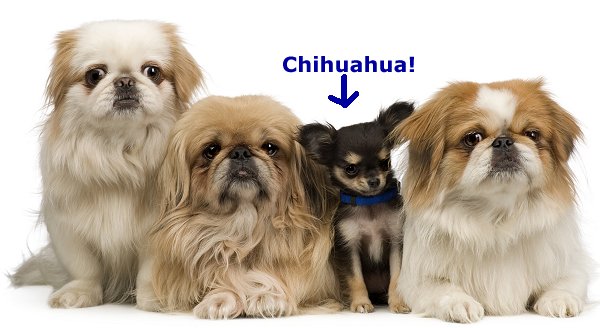
 |
Dog Breed Traits – Which Traits Are Right For You? In this brand new series, I'll help you decide which dog breed traits would best suit you and your family, your home and yard, and your lifestyle, so you can choose the best dog breed for your family. |
Keep in mind that the inheritance of temperament is less predictable than the inheritance of physical traits such as size or shedding. Temperament and behavior are also shaped by raising and training.
FREE eBooks by Michele Welton
![]() "Respect Training for Puppies" and "Teach Your Dog 100 English Words" are free step by step guides to teaching your pup to be calm and well-behaved.
"Respect Training for Puppies" and "Teach Your Dog 100 English Words" are free step by step guides to teaching your pup to be calm and well-behaved.
![]() "11 Things You Must Do Right To Keep Your Dog Healthy and Happy" is a free guide to keeping your dog mentally, physically, and emotionally happy and healthy so you can enjoy a longer lifetime of companionship.
"11 Things You Must Do Right To Keep Your Dog Healthy and Happy" is a free guide to keeping your dog mentally, physically, and emotionally happy and healthy so you can enjoy a longer lifetime of companionship.

- You can avoid some negative traits by choosing an ADULT dog from an animal shelter or rescue group. With an adult dog, you can easily see what you're getting, and plenty of adult Pekingese have already proven themselves not to have negative characteristics.
- If you want a puppy, you can avoid some negative traits by choosing the right breeder and the right puppy.
More traits and characteristics of the Pekingese
If I was considering a Pekingese, I would be most concerned about...
- Health problems. Unfortunately, breeders deliberately breed Pekingese to be deformed, with a short face and domed head. As such, they suffer more than their share of health problems – not only with their breathing, but also eye diseases, joint diseases, and itchy skin conditions. See Pekingese Health.
- Pekingese "sounds". Most Pekingese snort, snuffle, wheeze, grunt, and snore loudly. The sounds are endearing to some people; nerve-wracking to others.
- Lots of grooming. Without frequent brushing and combing, your Pekingese will become a matted mess. Occasional trimming around the dog's hind end is also necessary, for sanitary purposes.
- Heavy shedding. Pekingese shed a lot. You'll find hair and fur all over your clothing and furnishings.
- Gassiness (flatulence). All short-faced breeds gulp air when they eat, and that air has to go somewhere, after all. However, commercial diets make flatulence worse by including fibrous or hard-to-digest ingredients. Pekingese who are fed a heavily meat-based diet have much less trouble with gassiness.
- Housebreaking. Pekingese can be slow to pick up the concept of housebreaking. Expect several months of consistent crate training.
- Stubbornness. Most Pekingese are stubborn, usually in a passive-resistance sort of way. You must show them, through absolute consistency, that you mean what you say. Food is a great motivator with this breed, but too many cookies equals a fat Peke. Also you don't want a dog who only obeys when you're waving a biscuit at him.
Instead you should establish the right relationship where you are the leader and he is the follower. In other words, you must teach your Pekingese to respect you. Follow my free online training programs.
My best-selling books – now available FREE on my website
 Respect Training For Puppies: 30 seconds to a calm, polite, well-behaved puppy is for puppies 2 to 18 months old. Your puppy will learn the 21 skills that all family dogs need to know. Click here to read for free.
Respect Training For Puppies: 30 seconds to a calm, polite, well-behaved puppy is for puppies 2 to 18 months old. Your puppy will learn the 21 skills that all family dogs need to know. Click here to read for free. Teach Your Dog 100 English Words is a unique Vocabulary and Respect Training Program that will teach your adult dog to listen to you and do what you say. Click here to read for free.
Teach Your Dog 100 English Words is a unique Vocabulary and Respect Training Program that will teach your adult dog to listen to you and do what you say. Click here to read for free. 11 Things You Must Do Right To Keep Your Dog Healthy and Happy helps your dog live a longer, healthier life. Get my honest advice about all 11 Things before you bring home your new puppy, because some mistakes with early health care cannot be undone. Click here to read for free.
11 Things You Must Do Right To Keep Your Dog Healthy and Happy helps your dog live a longer, healthier life. Get my honest advice about all 11 Things before you bring home your new puppy, because some mistakes with early health care cannot be undone. Click here to read for free.Related posts you might enjoy



